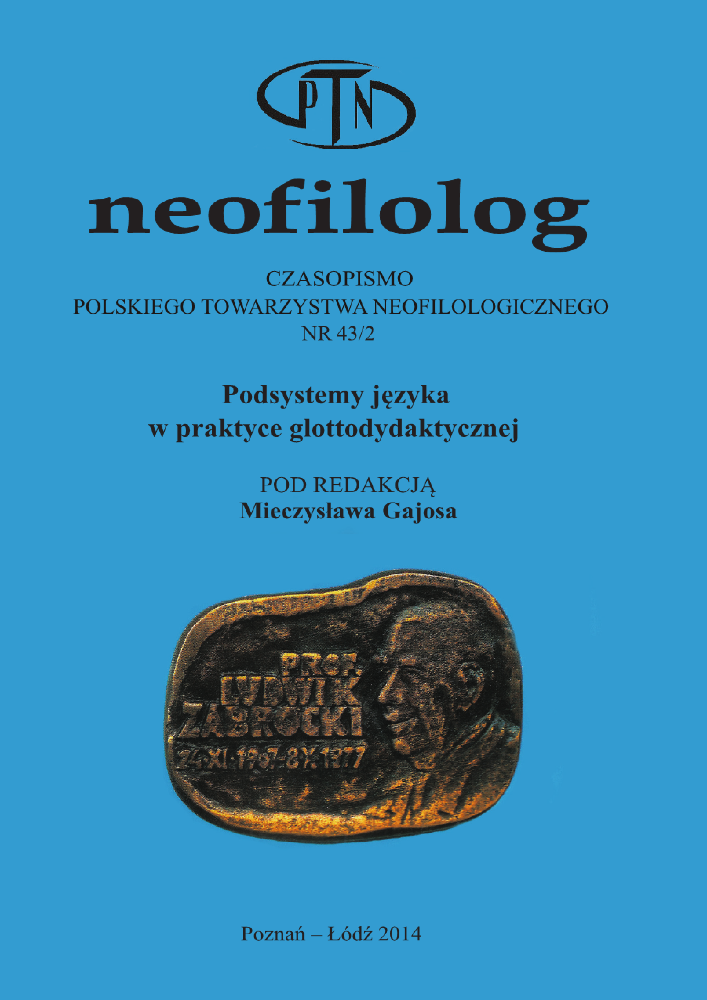Abstract
The aim of the article is to focus on the cognitive mechanisms that motivate the meanings of idioms as presented by Zoltán Kövesces. Contrary to traditional view, according to which an idiom is an expression whose overall meaning differs from the meanings of its constituents, cognitive linguistics claims that the meaning of a large number of idioms is not arbitrary but motivated. It rejects the “dead metaphor” perspective in favour of underlining relations between domains. The approach, which underlines the embodied aspects of language and cognition, appears tempting in particular in relation to body-related idioms. Metaphorical awareness can play a role of comprehensible input in learning idiomatic language.References
Black, Max. «Jeszcze o metaforze». Przekł. Maria Bożenna Fedewicz wg: M. Black, «More about metaphor» (w) Metaphor and thought (red. A. Ortony). New York 1979. Warszawa; Wrocław: Instytut Badań Literackich PAN, 1983. Nadb. z: "Pamiętnik Literacki" 1983, z. 2.
Croft, W. D.,Cruse, A. 2004. Cognitive Linguistics. Cambridge: Cambridge University Press.
Dakowska, M. 1997. «Koncepcje kognitywne a modelowanie akwizycji języków obcych» (w) Podejście kognitywne w lingwistyce, translatoryce i glottodydaktyce (red. F. Grucza, M. Dakowska). Warszawa: Wydawnictwo Uniwersytetu Warszawskiego: 99 -111.
Dakowska, M. 2001. Psycholingwistyczne podstawy dydaktyki języków obcych. Warszawa: PWN.
Edge, J., Garton, S. 2009. From Experience to Knowledge in ELT. Oxford: Oxford University Press.
Ellis, R. 1985. Understanding Second Language Acquisition. Oxford: Oxford University Press.
Komorowska. H. 2005. Metodyka nauczania języków obcych. Warszawa: Fraszka Edukacyjna.
Kövesces, Z. 2002. Metaphor: A Practical Introduction. Oxford: Oxford University Press.
Krzeszowski, T. 1997. «O znaczeniu przymiotnika kognitywny». (w) Podejście kognitywne w lingwistyce, translatoryce i glottodydaktyce (red. F. Grucza, M. Dakowska). Warszawa: Wydawnictwo Uniwersytetu Warszawskiego: 99 -111.
Lakoff, G., Johnson M. 1988. Metafory w naszym życiu. Warszawa: PIW.
Langacker, R. 2008. «Cognitive Grammar as a basis for language instruction» (w) Handbook of Cognitive Linguistics and Second Language Acquisition (red. P. Robinson, N. Ellis). New York/ London: Routledge.
Laskowski, M. 2005. «Założenia integracyjne językoznawstwa kognitywnego – implikacje glottodydaktyczne». Neofilolog 27: 89-95.
McLaughlin, B. 1987. Theories of Second Language Learning. London: Edward Arnold.
Piątkowska, K. 2005. «Nauczanie angielskich przyimków zgodnie z założeniami językoznawstwa kognitywnego». Neofilolog 26: 44-51.
Seidle, J., McMordie, W. 1978. English Idioms and how to Use them. Oxford: Oxford University Press.
Skrzypczak, W. 1994. Communicative Skills and Beyond. Toruń: UMK.
Skrzypczak, W. 2006. Analog-Based Modelling of Meaning Representations in Eng-lish. Toruń: Wydawnictwo Uniwersytetu Mikołaja Kopernika.
Szudy-Sojak, A. 2014. „Skuteczność nauczania polisemicznych wyrazów związanych z częściami ciała zgodnie z zasadami lingwistyki kognitywnej”. Lingwistyka Stosowana 9: 151-170. http://www.ls.uw.edu.pl/documents/7276721/12255677/Lingwistyka+Stosowana+9+Aleksandra+Szudy-Sojak.pdf
Tabakowska, E. (red.) 2001. Kognitywne podstawy języka i językoznawstwa. Kraków: TAiWPN Universitas.
Turewicz, K. 2000. Applicability of Cognitive Grammar as a Foundation of Pedagogical/ Reference Grammar. Łódź: Wydawnictwo Uniwersytetu Łódzkiego.
License
Copyright (c) 2019 Neofilolog

This work is licensed under a Creative Commons Attribution-NoDerivatives 4.0 International License.
Authors
Authors of texts accepted for publication in Neofilolog are required to complete, sign and return to the Editorial team’s office the Agreement for granting a royalty-free license to works with a commitment to grant a CC sub-license.
Under the agreement, the authors of the texts published in Neofilolog grant Adam Mickiewicz University in Poznań a non-exclusive, royalty-free license and authorize the use of Attribution-NoDerivatives 4.0 International (CC BY-ND 4.0) Creative Commons sub-license.
The authors retain the right to the free disposal of the work.
Users
Interested Internet users are entitled to use works that have been published in Neofilolog since 2017, under the following conditions:
▪ attribution – obligation to provide, together with the distributed work, information about the authorship, title, source (link to the original work, DOI) and the license itself.
▪ no derivatives – the work must be preserved in its original form. Without the author's consent, it is not possible to distribute the modified work in the form of translations, publications, etc.
Copyrights are reserved for all texts published since 2017.
Miscellaneous
Adam Mickiewicz University in Poznań retains the property right as a whole (layout, graphic form, title, cover design, logo etc.).
